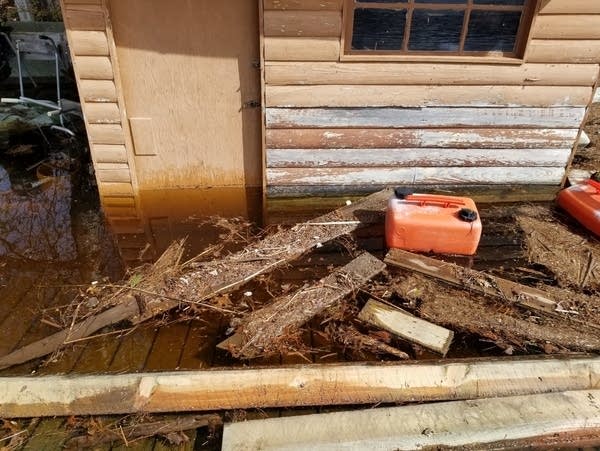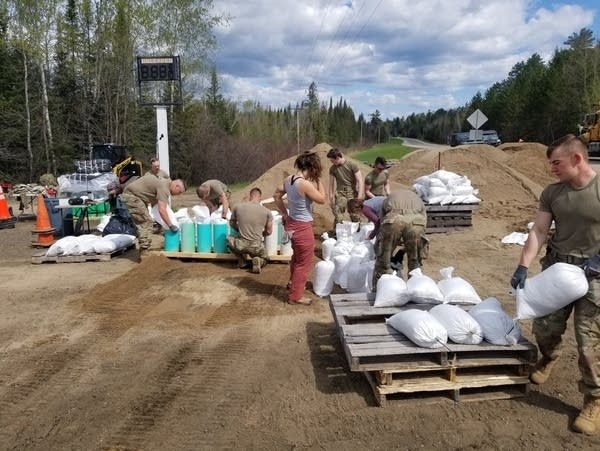Border restrictions keep flooded cabin and resort owners away from their properties

Updated: May 25, 8:50 a.m.
The water level of Sand Point Lake along the Minnesota-Ontario border continues to rise. Docks are submerged, propane tanks are floating in the water, and floodwaters are lapping against the sides of buildings.
Yet dozens of cabin and resort owners on the Canadian side of the lake can’t access their properties, because a Canadian customs office on the lake remains closed.

“It’s a helpless feeling,” said Cindy Hall, who, along with her husband, Doug, owns Sand Point Lodge, a small fishing resort on the Canadian side of Sand Point Lake.
According to the Halls, there are around 75 cabins, in addition to the lodge, located on the northern shores of Sand Point and Namakan — huge lakes along the border near Voyageurs National Park that are experiencing near record-setting flooding, caused by a deep winter snowpack that was followed by drenching spring rains.
Create a More Connected Minnesota
MPR News is your trusted resource for the news you need. With your support, MPR News brings accessible, courageous journalism and authentic conversation to everyone - free of paywalls and barriers. Your gift makes a difference.
To get there, most everyone travels by boat — starting in Crane Lake, Minn., and heading across the international border. The Canadian government operates a small, remote customs office on Government Island on Sand Point Lake, where boaters are required to check in.
Canada reopened more than 300 so-called “small vessel reporting sites” on Friday that had been closed for more than two years because of the pandemic.
But the post on Sand Point Lake remains closed, the Canada Border Services Agency wrote in a news release, because of “flooding-induced water damages.”
That’s left the Halls and cabin owners with no legal means of traveling to their properties. They could drive across the border to a remote boat launch on the north side of Sand Point Lake. But that’s a journey of over 100 additional miles, and the ramp there is flooded.
People are allowed to boat into Canadian waters, as long as they don’t walk on shore. So, earlier this week, Doug Hall checked out the damage to the resort.
Three dock cribbings had washed away. Two propane tanks were floating in the water. Water surrounded two buildings. But he couldn’t legally get out of his boat to try to protect his property.

He managed to load the two floating tanks onto his boat. Luckily the valves were off, so no propane escaped. He tied the remaining tanks to trees and placed sandbags on them from the front of his boat to try to prevent them from washing away.
He said water is about three inches up on a big, 2,000-gallon gasoline tank near the shore of the lake. That’s his big concern — that gas could leak into the lake.
“We’re getting almost to the point where we don't know what else to do. We're gonna have to do what we have to do. Border or no border, we're gonna have to do something just to secure everything,” said Hall. “I'm at wits’ end.”
The Halls have asked Canadian officials to grant them emergency access to their properties. But they say they’ve been told there are no exceptions.
Prior to the pandemic, property owners and tourists could purchase what’s known as a Remote Area Border Crossing, or RABC, permit, to cross the border without going through customs, when the Sand Point Lake post was closed.

Paddlers and anglers also used the RABC program to cross into Canadian waters from the Boundary Waters Canoe Area, and other lakes and rivers along the border.
But that program, which is primarily used along the Minnesota-Ontario border, was suspended in May 2020 due to the COVID-19 pandemic, and hasn’t been reinstated.
Minnesota politicians, including U.S. Sen. Amy Klobuchar, have encouraged the U.S. State Department to push Canada to resume issuing RABC permits.
Without them, Klobuchar wrote in a March letter to Secretary of State Antony Blinken and Homeland Security Secretary Alejandro Mayorkas, “many properties and businesses remain functionally unreachable.”
A spokesperson for the Canada Border Services Agency said they are “currently assessing a plan for the re-opening of the RABC program.”
But currently the Canadian government is requiring all visitors to Canada to report to a Border Services officer to confirm their compliance with the country’s public health measures. Canada requires that all unvaccinated visitors provide proof of a negative COVID-19 test.
Julia Ponder, who owns a cabin on Sand Point Lake, said she understands that the current customs post on the lake is flooded and can’t be reopened until the water recedes. But she and others are frustrated that the Canadian government hasn’t been willing to come up with a work-around.

“There's a natural disaster unfolding that is causing damage that the properties need to be protected from,” Ponder said. “So not only can we not access them for our enjoyment for the past few years, but we literally cannot protect them and prevent damage.”
For the Halls, the flooding comes at an especially difficult time. Because of the border closure during the pandemic, they were unable to open Sand Point Lodge the past two summers.
They were hoping for a bounce-back summer this year. They were booked out for six weeks. But now they’re closed indefinitely. And even when they’re allowed to access their property again, they don’t know what kind of damage they’ll face.
“I don't know how much longer I can hold on,” said Doug Hall. “I'm bleeding into my own personal 401K trying to keep this thing alive. It’s like paying for a house and not being able to live in it.”